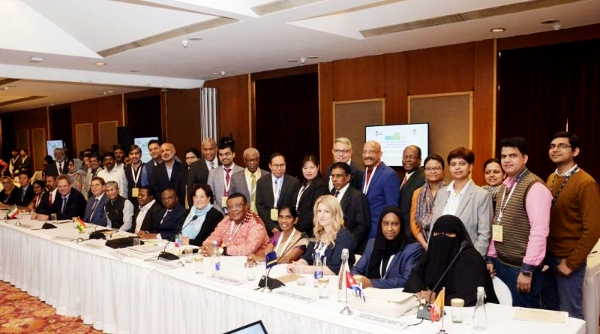New Delhi: ICoSDiTAUS-2020, the two-day International Conference on Standardisation of Diagnosis and Terminologies in Ayurveda, Unani and Siddha Systems of Medicine concluded in New Delhi today with adopting the ‘New Delhi Declaration on Collection and Classification of Traditional Medicine (TM) Diagnostic Data.’ The sixteen countries which came together for the cause of traditional medicine at this conference are Sri Lanka, Mauritius, Serbia, Curacao, Cuba, Myanmar, Equatorial Guinea, Qatar, Ghana, Bhutan, Uzbekistan, India, Switzerland, Iran, Jamaica, and Japan.
ICoSDiTAUS-2020 is the biggest ever international event dedicated to standardisation of Diagnosis and Terminologies of Traditional Medicine in terms of the broad level of participation covering virtually all the continents.
The inaugural address of Poonam Khetrapal Singh, Regional Director, WHO South East Asia Regional Office (SEARO) on 25 February set the tone for the conference and underlined the power of TM systems and their significance in addressing the public health challenges of the 21 century. Samira Asma, Assistant Director General, WHO, joined in through video conference and emphasised the potential of strategic use of data and evidence to advance TM systems into public health. Rajesh Kotecha, Secretary, AYUSH, in his talk in the inaugural session explained the extent of the contribution being made in traditional medicine systems in India in the effort to achieve universal health coverage.
The topics discussed in the conference included:
- The challenges in counting and classification of traditional medicine encounters.
- Adapting ICD to TM systems and their implementation.
- Relevance and regulation of traditional medicine in health systems.
- TM data and digital health, in which the global picture was presented by Kenji Watanabe of Japan, a leading proponent of adoption of TM in public health.
Country perspectives were given by different participants. Alexander Kodwo Kom Abban, Deputy Minister for Health, Govt. of Ghana, and Suzanne Camelia Romer, Minister of Health of Curacao, took leadership roles in the deliberations and strongly advocated adopting information technology and new statistical tools for advancing the practice of traditional medicine systems across the globe.
The conference succeeded in taking forward the objective of expanding the International Classification of Diseases (ICD) into the realm of traditional medicine systems at a conceptual level with all the countries endorsing. There was also a consensus that work on the second module of the Traditional Medicine Chapter of ICD should be expedited, and collaborative efforts of stake-holding countries are needed for this. The suitability of Ayurveda, Unani, and Siddha systems for inclusion in the TM Chapter of ICD was also pointed out.
The New Delhi declaration emphasised the commitment of the countries to Traditional Medicine as a significant area of health care. It further sought the opportunity for including traditional systems of medicine like Ayurveda, Unani, and Siddha in the International Classification of Diseases of WHO, which is the standard diagnostic tool for health management across the world.
Source: Indus Dictum
Image Courtesy: Indus Dictum
You may also like
-
IAF Aircraft Set Course For Exercise Eastern Bridge VII At Oman
-
India-us Working Together In Areas Like Critical Minerals, Supply Chains And Advanced Technologies: Shri Piyush Goyal
-
Defence Secretary to co-chair 5th India-Philippines Joint Defence Cooperation Committee meeting in Manila
-
India Against Mpox
-
Combination of ‘Siddha’ Drugs Reduces Anemia in Adolescent Girls: Study
